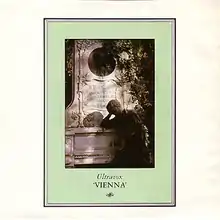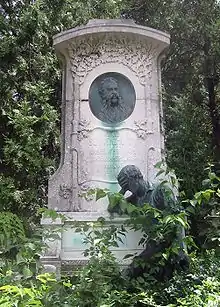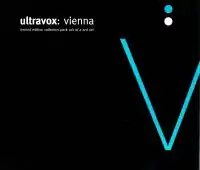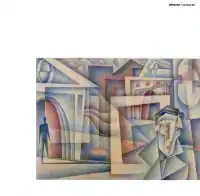Vienna (Ultravox song)
"Vienna" is a 1980 song by British new wave band Ultravox. It was released as the third single from the band's fourth album Vienna on 9 January 1981 through Chrysalis Records.[1] It spent four consecutive weeks at number two in the UK Singles Chart without ever getting to number one;[3] it was kept off the number one spot by John Lennon's "Woman" for a week,[4] and then by Joe Dolce's "Shaddap You Face", for a further three weeks.[5][6][7] "Vienna" is ranked as the fifth-best-selling UK single for 1981.[8][9] The single was certified Gold by the British Phonographic Industry in February 1981,[1] for UK sales exceeding 500,000 copies. The single peaked at number one on the Top 40 charts in many European countries including the Netherlands, Belgium and Ireland.
| "Vienna" | ||||
|---|---|---|---|---|
 | ||||
| Single by Ultravox | ||||
| from the album Vienna | ||||
| B-side |
| |||
| Released | 9 January 1981[1] | |||
| Recorded | February 1980 | |||
| Studio | RAK Studios (London) | |||
| Genre | Synth-pop, new wave, avant-pop[2] | |||
| Length |
| |||
| Label | Chrysalis | |||
| Songwriter(s) | ||||
| Producer(s) |
| |||
| Ultravox singles chronology | ||||
| ||||
It also won "Single of the Year" at the 1981 Brit Awards. The song is regarded as a staple of the synthpop genre that was popularised in the early 1980s. The song was also performed at the 1985 Live Aid concert in Wembley Stadium. It remains Ultravox's signature song, being their most commercially successful release and is often performed live by Midge Ure in solo performances.
It was voted Britain's favourite single to ever peak at number two in the charts in a 2012 poll run by BBC Radio 2 and the Official Charts Company. It was awarded an honorary number one by the OCC.[10]
Background
"Vienna" was written in January 1980.[11] The song features a dramatic grand piano in the verses and chorus, and a violin solo in the middle of the song. Other sounds include a solid synth bass line played on a MiniMoog, an Elka string synthesiser and a Roland CR-78 drum machine. The drum machine pattern created by Warren Cann was the basis of the song.[12] Then, Cann and the classically trained Billy Currie together wanted to create something that might sound like it had been written by a late-19th-century romantic composer, so they started creating the basic chords and sounds of the song, and the romantic violin solo was influenced by the German composer Max Reger.[11] The lyrics, which are about a brief love affair in the city of Vienna, were quickly written by Midge Ure. According to Currie, Ure was hesitant about the overly classical romantic feel of the orchestration, and said: "This means nothing to me," to which the producer Conny Plank replied: "Well, sing that then." Ure said that he had in his mind only the line "The feeling is gone, this means nothing to me – oh Vienna!" when he went into studio.[11] Then he wrote the vocal part while bass player Chris Cross started playing some bass lines with his synthesizer.
In interviews at the time it was said that the song took its inspiration from the 1948 film The Third Man, which is based around the Austrian capital, but Midge Ure later admitted he made that up when asked what the song was about.[12] Ure is said to have been influenced by The Walker Brothers' 1978 single "The Electrician".[13]
Ure said of the track: "We wanted to take the song and make it incredibly pompous in the middle, leaving it very sparse before and after, but finishing with a typically over-the top classical ending."[14]
Release
The song became the title track on the band's album Vienna, released in 1980. The record company Chrysalis Records was reluctant to release the song as a single, as they thought it was too slow and too long to be successful. But the band wanted to release it as a single and it was released as the album's third single in January 1981. The single was hugely successful and reached number 2 on the UK Singles Chart, and peaked at number 1 in Belgium, Ireland and the Netherlands.[11] It was unlucky to miss the Australian Top 10, remaining at number 11 for three weeks.
Music video

The music video, directed by Russell Mulcahy,[15] is particularly evocative of The Third Man. It was Ultravox's second video, after "Passing Strangers" (also with Mulcahy), and cost £6000–£7000, footed by the band after Chrysalis refused to fund it.
"It may come as a surprise to know that approximately half of it was shot on locations in central London, mainly at Covent Garden and also in the old Kilburn Gaumont Theatre in North London (now a Bingo hall). The embassy party scene was in some house we’d rented in town. Can’t remember where, but I do remember that it took the crew a long time to set up the lights to prepare for filming. So long that we all got impatient with waiting and dipped into the many cases of wine we’d laid on for refreshment after the shoot. By the time the crew was ready to film, we were all well partying for real."
"The other half was in Vienna. We did it on the cheap. There was just us and Nick, our trusty camera man. We took an early morning flight to Vienna, ran round like loonies in and out of taxis as we filmed, and soon discovered that, due to it being the winter off-season, many of the splendid places we’d been counting upon filming were either shut for redecorating or covered with webs of scaffolding. “What do you mean it’s ‘closed for repairs’?!” We finished up in the cemetery for the shots with the statue which had been used for the single’s cover (a gentleman who made pianos for the rich and famous of his time, I believe), did the sunset shot, and then dashed back to London to start editing."
The gravestone that is shown in the video and on the single cover is part of the grave of Carl Schweighofer and is located on the Zentralfriedhof in Vienna. Schweighofer was a famous Austrian piano manufacturer.
B-sides
The B-side to the single is "Passionate Reply", a light, poppy synthpop song similar to many tracks on the Vienna album. The 12" single also features "Herr X", a version of the Kraftwerk-esque album track "Mr. X" sung entirely in German by Warren Cann with the aid of native German producer Conny Plank. Both tracks were included on the remastered CD version of the Vienna album as bonus tracks.
Reissue
| "Vienna" | ||||
|---|---|---|---|---|
 CD single #1 | ||||
| Single by Ultravox | ||||
| from the album If I Was: The Very Best of Midge Ure & Ultravox | ||||
| B-side |
| |||
| Released | January 1993 | |||
| Recorded | February 1980 at RAK Studios | |||
| Length | 4:37 | |||
| Label | Chrysalis | |||
| Songwriter(s) | ||||
| Producer(s) |
| |||
| Ultravox singles chronology | ||||
| ||||
In 1993 "Vienna" was re-released by Chrysalis, to promote the Midge Ure/Ultravox greatest hits compilation If I Was: The Very Best of Midge Ure & Ultravox. This reissue peaked at number 13 in the UK Singles Chart.[17] Like the compilation album, the single also included songs by Midge Ure (as B-sides).
Track listings
All songs written and composed by Warren Cann, Chris Cross, Billy Currie and Midge Ure, except where noted.
1981
- 7" vinyl
- UK, Australia: Chrysalis / CHS 2481
- Germany, Netherlands: Chrysalis / 102 905
| No. | Title | Length |
|---|---|---|
| 1. | "Vienna" (Single edit) | 4:37 |
| No. | Title | Length |
|---|---|---|
| 1. | "Passionate Reply" | 4:17 |
- 12" vinyl
- UK, France: Chrysalis / CHS 12 2481
- Germany: Chrysalis / 600 352-213
- Netherlands: Chrysalis / 12.2481
| No. | Title | Length |
|---|---|---|
| 1. | "Vienna" | 4:53 |
| No. | Title | Length |
|---|---|---|
| 1. | "Passionate Reply" | 4:17 |
| 2. | "Herr X" | 5:49 |
1993
- CD
- UK: Chrysalis / CDCHS 3936
- UK: Chrysalis / CDCHSS 3936 ("Limited edition collectors pack CD1 of a 2CD set", with space for the second CD)
| No. | Title | Writer(s) | Artist | Length |
|---|---|---|---|---|
| 1. | "Vienna" | Ultravox | 4:37 | |
| 2. | "Answers to Nothing" | Ure | Midge Ure | 3:40 |
| 3. | "The Voice" | Ultravox | 4:24 | |
| 4. | "Wastelands" |
| Midge Ure | 4:22 |
- UK: Chrysalis / CDCHS 3937
| No. | Title | Writer(s) | Artist | Length |
|---|---|---|---|---|
| 1. | "Vienna" | Ultravox | 4:37 | |
| 2. | "Call of the Wild" | Ure | Midge Ure | 4:18 |
| 3. | "One Small Day" | Ultravox | 4:27 | |
| 4. | "Hymn" | Ultravox | 4:24 |
Charts
Weekly charts
|
Year-end charts
|
Vienna 92
| "Vienna 92" | ||||
|---|---|---|---|---|
 | ||||
| Single by Ultravox | ||||
| B-side | "Systems of Love" | |||
| Released | April 1992 | |||
| Recorded | Berwick Street Studios, London | |||
| Genre | ||||
| Length |
| |||
| Label | ZYX | |||
| Songwriter(s) | ||||
| Producer(s) |
| |||
| Ultravox singles chronology | ||||
| ||||
In April 1992, a re-recorded version of "Vienna", by a new Ultravox line-up, was released as a single in Germany. This line-up consisted of original Ultravox member Billy Currie on keyboards, violin and percussion, and Tony Fenelle on vocals, guitar and percussion. The backing vocals on B-side "Systems of Love" were performed by Alison Limerick and Jackie Williams. The single did not chart. On the album Revelation, it was not included.
Track listings
- 12" vinyl
- Germany: ZYX / 6767-12
| No. | Title | Writer(s) | Length |
|---|---|---|---|
| 1. | "Vienna 92" (Goodnight Vienna remix) | 7:31 |
| No. | Title | Writer(s) | Length |
|---|---|---|---|
| 1. | "Vienna 92" (The classic mix) |
| 4:35 |
| 2. | "Systems of Love" |
| 4:31 |
- CD
- Germany: ZYX / 6767-8
| No. | Title | Writer(s) | Length |
|---|---|---|---|
| 1. | "Vienna 92" (The classic mix) |
| 4:35 |
| 2. | "Vienna 92" (Goodnight Vienna remix) |
| 7:31 |
| 3. | "Systems of Love" |
| 4:31 |
Cover versions
Vic Reeves
In 1992, comedian Vic Reeves (Jim Moir) appeared on the album Ruby Trax - The NME's Roaring Forty, singing a version of the song with different lyrics in the verses. The compilation was released by the NME, an 'inkie' rock newspaper that had been publishing singles charts since 1952, with all records covered having reached the number one slot in their own charts during forty years of publication.[29][30][31] As "Vienna" by Ultravox reached number one on the NME charts on 21 February 1981 (staying at the top for one week) it was eligible for inclusion within the concept of the project, where it would not have been allowed if the NME had been following the British Market Research Bureau/Gallup chart (now branded as the Official Chart).
In popular culture
"Vienna" is played at the beginning of season one, episode nine of the true crime drama "The Assassination of Gianni Versace."[32] Featured in season one of the series "13 Reasons Why" and fourth season of "The Crown".
References
- "BPI > Certified Awards > Search results for 'Ultravox' (page 2)". British Phonographic Industry. Retrieved 8 February 2016.
- Dalton, Stephen (17 February 2020). "Midge Ure: Forum, Bath". The Times. Retrieved 29 November 2020.
- "Official Chart Company - Ultravox". The Official UK Charts Company. Retrieved 8 February 2016.
- "Official Singles Chart Top 75 > 08 February 1981 - 14 February 1981". The Official UK Charts Company. Retrieved 8 February 2016.
- "Official Singles Chart Top 75 > 15 February 1981 - 21 February 1981". The Official UK Charts Company. Retrieved 8 February 2016.
- "Official Singles Chart Top 75 > 22 February 1981 - 28 February 1981". The Official UK Charts Company. Retrieved 8 February 2016.
- "Official Singles Chart Top 75 > 01 March 1981 - 07 March 1981". The Official UK Charts Company. Retrieved 8 February 2016.
- Scaping, Peter, ed. (1982). "The Top 200 Singles: January–December 1981". BPI Year Book 1982 (5th ed.). London, England: The British Phonographic Industry Ltd. pp. 46–49. ISBN 0-906154-03-0.
- Jones, Alan; Lazell, Barry; Rees, Dafydd (1982). "The Top 200 Singles (UK)". Chart File 1982. London, England: Virgin Books. pp. 74–77. ISBN 0-907080-49-9.
- Barnes, Anthony (31 December 2012). "Ultravox hit 'Vienna' named nation's favourite number two single". The Independent.
- Sullivan, Caroline (18 July 2017). "How we made Ultravox's Vienna". The Guardian.
- Webb, Robert (22 August 2008). "Story of the Song: 'Vienna', Ultravox (1981)". The Independent.
- Dave Thompson. "Nite Flights - The Walker Brothers | Songs, Reviews, Credits, Awards". AllMusic. Retrieved 3 July 2014.
- Dave Thompson. "Vienna - Ultravox | Listen, Appearances, Song Review". AllMusic. Retrieved 3 July 2014.
- Garcia, Alex S. "Ultravox - Vienna (version 1: concept)". Music Video Database. Retrieved 26 July 2009.
- Wårstad, Jonas (1997). "Ultravox: The Story" (PDF). pp. 44–45. Retrieved 26 July 2009.
- "Official Singles Chart Top 75 > 07 February 1993 - 13 February 1993". The Official UK Charts Company. Retrieved 8 February 2016.
- Kent, David (1993). Australian Chart Book 1970–1992 (illustrated ed.). St Ives, N.S.W.: Australian Chart Book. p. 317. ISBN 0-646-11917-6.
- "Ultravox - Vienna - austriancharts.at" (in German). Retrieved 26 July 2009.
- "Ultratop > Ultravox - Vienna" (in Dutch). Hung Medien. Retrieved 8 February 2016.
- "Offizielle Deutsche Charts > Ultravox - Vienna (single)" (in German). GfK Entertainment. Retrieved 8 February 2016.
- "irishcharts.ie search results". Retrieved 26 July 2009.
- "dutchcharts.nl - Ultravox - Vienna" (in Dutch). Retrieved 26 July 2009.
- "Nederlandse Top 40 - Week 15, 1981" (in Dutch). Retrieved 26 July 2009.
- "charts.nz > Ultravox - Vienna (song)". Hung Medien. Retrieved 8 February 2016.
- "SA Charts 1969 - 1989 (As presented on Springbok Radio/Radio Orion) > Acts U". Sugar Music. Retrieved 8 February 2016.
- "swedishcharts.com - Ultravox - Vienna". Retrieved 26 July 2009.
- "Kent Music Report No 393 – 4 January 1982 > National Top 100 Singles for 1981". Kent Music Report. Retrieved 22 December 2020 – via Imgur.com.
- https://www.officialcharts.com/who-we-are/fifties-history/
- https://www.officialcharts.com/who-we-are/how-we-built-our-database/
- https://www.officialcharts.com/who-we-are/eighties/
- "'The Assassination of Gianni Versace: American Crime Story' Season Finale Recap: This Means Nothing To Me". Decider. 22 March 2018. Retrieved 26 August 2020.